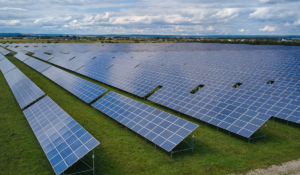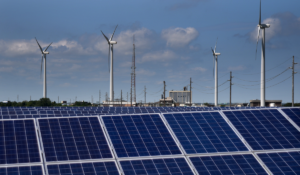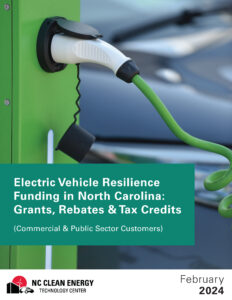2023 Trends Mapping Clean Energy Policy Advances in the United States
 In the dynamic landscape of clean energy policy across the nation, the North Carolina Clean Energy Technology Center (NCCETC) serves as a valuable hub of comprehensive research, analysis and education. Through its Policy & Markets program, NCCETC meticulously tracks and evaluates the evolution of energy policy, examining its potential implications on clean energy technologies.
In the dynamic landscape of clean energy policy across the nation, the North Carolina Clean Energy Technology Center (NCCETC) serves as a valuable hub of comprehensive research, analysis and education. Through its Policy & Markets program, NCCETC meticulously tracks and evaluates the evolution of energy policy, examining its potential implications on clean energy technologies.
The Database of State Incentives for Renewables and Efficiency© (DSIRE) is a pivotal resource providing unmatched insights into the diverse array of policies and incentives supporting renewable energy and energy efficiency nationwide. Bolstered by a team committed to objectivity and expertise, NCCETC not only operates DSIRE but also extends its reach through DSIRE Insight, offering pertinent policy research and analysis services to energy professionals, advocates, policymakers, utilities and clean energy businesses.
A cornerstone of NCCETC’s efforts is The 50 States report series, designed to keep industry stakeholders informed of the latest policy and regulatory developments in the clean energy sector. With quarterly reports spanning four crucial technology areas – Solar, Grid Modernization, Electric Vehicles and Power Decarbonization – NCCETC delivers timely, comprehensive and unbiased updates. Each report encapsulates a thorough review of actions taken each quarter, curated by a team of policy experts, complete with links to primary sources, summary graphics and acute analysis.
The 2023 annual review editions of The 50 States of Electric Vehicles, The 50 States of Solar, The 50 States of Grid Modernization and The 50 States of Power Decarbonization are out now, offering guidance to stakeholders, industry professionals and stakeholders alike. NCCETC’s policy team tracked more than 2,500 actions taken by states and utilities throughout 2023, including introduced legislation, active regulatory proceedings, executive orders and utility initiatives.
Top Policy Trends of 2023
 DSIRE is the most comprehensive source of information on incentives and policies that support renewables and energy efficiency in the United States, including summaries of more than 2,600 incentives and policies related to renewable energy, energy efficiency, energy storage, electric vehicles, and more.
DSIRE is the most comprehensive source of information on incentives and policies that support renewables and energy efficiency in the United States, including summaries of more than 2,600 incentives and policies related to renewable energy, energy efficiency, energy storage, electric vehicles, and more.
Brian Lips manages DSIRE and is a Senior Policy Project Coordinator for NCCETC. “DSIRE programs are continuously updated to ensure DSIRE remains the premier source of dependable information on policies and incentives for clean energy technologies,” Lips said. During 2023, more than 1,580 programs were updated on DSIRE.
2023 Solar Policy Action Expands Community Solar and Net Metering Alternatives
The 2023 annual review and Q4 update edition of The 50 States of Solar found that 47 states, plus the District of Columbia (DC) and Puerto Rico, took some type of distributed solar policy action during 2023. Noteworthy states leading in these actions include Maine, California, Colorado, Michigan, North Carolina, Arkansas and Connecticut.
In 2023, a total of 273 state and utility-level distributed solar policy and rate changes were proposed, pending, or decided upon. The report identifies ten significant distributed solar policy trends of 2023, including transitioning to net billing, incentivizing solar for low- to moderate-income customers, and expanding state community solar programs.
To ensure clean energy access for low- and moderate-income (LMI) customers, states and utilities across the country have taken actions such as expanding LMI carve-outs for community solar programs, while some states adopted dedicated or enhanced clean energy incentives for LMI customers.
Net metering activity has remained very high as states and utilities have transitioned away from traditional net metering structures. In 2023, states continued the trend of moving toward net billing structures for distributed solar generation. DSIRE published an updated detailed summary map on Net Metering policies as of November 2023. Currently, 34 states and DC, Puerto Rico, Guam and the US Virgin Islands have mandatory net metering rules. However, two of these states – Arkansas and Illinois – are currently in transition to policies other than net metering.
Another focal point for state policymakers was decommissioning and land use issues related to utility-scale renewable energy projects, including solar photovoltaic technology. NCCETC published The 50 States of Solar Decommissioning: 2023 Snapshot in January 2024. The report provides a comprehensive review of the state solar decommissioning policy landscape, as of the conclusion of 2023, including state legislative updates pertaining to decommissioning planning and financial assurances.
Grid Modernization Initiatives Across the 50 States in 2023
According to the 2023 annual review and Q4 update edition of The 50 States of Grid Modernization, a total of 774 grid modernization actions were recorded in 2023. All 50 states, including DC and Puerto Rico, took actions related to grid modernization last year, with notable attention given to energy storage deployment, utility business model reforms, distribution system planning, energy storage interconnection rules, and performance-based regulation.
Furthermore, the report highlights ten significant trends regarding grid modernization, such as the burgeoning interest in virtual power plants, the exploration of long-duration energy storage, and the implementation of innovative pilot programs by utilities.
With states and utilities pursuing efforts to aggregate the increasing power of distributed energy resources, the term “virtual power plant” saw a rise in popularity during 2023. The California Energy Commission approved a new incentive program aimed at encouraging virtual power plants, while regulators in Colorado initiated a new inquiry to examine the potential implementation of such systems.
Decarbonizing the US Electric Power Sector
The federal government’s ambition to achieve a carbon pollution-free power sector by 2035 and a net-zero economy by 2050 has catalyzed action across all 50 states, DC, and Puerto Rico. The 2023 annual review and Q4 2023 update edition of The 50 States of Power Decarbonization reported a total of 609 actions undertaken in pursuit of electric power decarbonization and resource planning throughout the year.
Michigan, Minnesota, Colorado, Maine, North Carolina, Virginia, Connecticut, Hawaii, Maryland, and Delaware emerged as leaders in driving impactful actions toward decarbonization in 2023. These actions included the establishment of 100% clean energy targets, prioritization of renewables in planned capacity additions by utilities, and the promotion of emerging clean energy resources such as offshore wind and advanced nuclear technologies.
Renewable Portfolio Standards (RPS) and Clean Energy Standards (CES) serve as primary legislative mechanisms for advancing the decarbonization of the US electricity supply. Eligible resources under these standards typically include renewable energy technologies like solar, wind, biomass, geothermal, and specific hydroelectric facilities, depending on the specifics of each state’s policy.
DSIRE recently updated its RPS and CES detailed summary map. Currently, RPS policies are enacted in 28 states plus DC, while 11 states have adopted CES. Furthermore, Puerto Rico, Guam, the US Virgin Islands, and the North Mariana Islands have implemented renewable portfolio targets at various levels.
Electric Vehicles on the Road Towards Sustainable Transportation
The 2023 annual review and Q4 2023 update edition of The 50 States of Electric Vehicles reveals that a total of 49 states, alongside DC and Puerto Rico, took actions pertaining to electric vehicles (EVs) and charging infrastructure. Predominantly, these actions centered around rebate and grant programs, fees for EV owners, rate design, infrastructure planning, and state procurement targets for electric or zero-emission vehicles.
In 2023, a total of 804 electric vehicle actions were recorded, with Colorado, California, Maryland, Minnesota, Michigan, Illinois, North Carolina, New Mexico, Hawaii, and Rhode Island emerging as the top ten states in terms of impactful actions. These states witnessed significant strides, ranging from policy implementations to infrastructure developments, reflecting a concerted effort to advance the adoption of electric vehicles nationwide.
 NCCETC recently released a new resource titled, “Electric Vehicle Resilience Funding in North Carolina: Grants, Rebates, and Tax Credits,” offering a lifeline to both commercial and public sector entities delving into EV adoption and infrastructure development. This guide aims to demystify the array of incentives available for EV purchases and charging station installations statewide, providing a roadmap for commercial and public sector entities embracing sustainable transportation solutions.
NCCETC recently released a new resource titled, “Electric Vehicle Resilience Funding in North Carolina: Grants, Rebates, and Tax Credits,” offering a lifeline to both commercial and public sector entities delving into EV adoption and infrastructure development. This guide aims to demystify the array of incentives available for EV purchases and charging station installations statewide, providing a roadmap for commercial and public sector entities embracing sustainable transportation solutions.
In conclusion, the collaborative efforts of states, utilities, policymakers, and industry stakeholders are driving profound transformations in the clean energy landscape, laying the foundation for a more sustainable and resilient future. As we navigate the complexities of transitioning to a low-carbon economy, NCCETC will continue to serve as a resource for innovative and sustainable clean energy practices and technologies through demonstration, education, technical assistance, outreach and training.